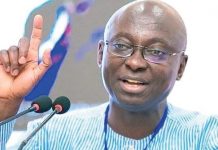 The chairman of the National Media Commission (NMC), Mr Yaw BoaduAyeboafoh says his outfit is under resourced and that sometimes it takes six to nine months for their allowances to be paid. This, he said, is affecting the efficiency of members in delivering on their mandate.
The chairman of the National Media Commission (NMC), Mr Yaw BoaduAyeboafoh says his outfit is under resourced and that sometimes it takes six to nine months for their allowances to be paid. This, he said, is affecting the efficiency of members in delivering on their mandate.
“You know, sometimes even the payment of our allowances are delayed unduly.If majority of the Commission members are not working and if they were people who did not have their source of living and they were to depend on their allowances that they were to receive from the commission, then it would have created some difficulty. Because if for 6 months, 7 months, 8 months, 9 months allowance has not been paid, how do you expect the person to commit him or herself to serve this public interest, “he asked.
The NMC Chairperson was speaking at an engagement organised by the Ministry of Parliamentary Affairs, intended to deepen the relationship between the NMC and the legislative arm of government.
Held at the precinct of Parliament, the Ministry indicated that its collective interest is for the NMC to be adequately resourced and capacitated to carry on the responsibility that it was given by the constitution to perform.
The National Media Commission was set up on July 7, 1993, by an Act of the Parliament of the Republic of Ghana (Act 449), in accordance with Chapter 12 of the 1992.
It was to, among others, take all measures to ensure the establishment and maintenance of the highest journalistic standards of the mass media, including investigation, mediation and settlement of complaints made against or by the press or other mass media.
It is also to promote and safeguard the freedom and independence of the media, encourage responsible practice and investigate, mediate and settle complaints made against the media.
But speaking at the engagement, where the leadership of Parliament was present, Mr Ayeboafoh noted that the NMC has a biggertask than the Electoral Commission (EC), yet the EC is more resourced than the NMC.
He said the EC is usually seenas working when elections are approaching and its members are full-time and yet members of the NMC are not full-time, even though they have enormous tasks to perform.
“The EC comes up once in a while in 4years when elections are to be conducted. After that there is not much that we hear about the EC aandyet, the NMC members are not full-time members and yet the work that we are doing isfull-time.”
He urged parliament to take a critical look at the situation and remedy it because no one commission created by an Act of Parliament is important than any other.
“The time has come for us to look at this. No Commission is better than the other,” Ayeboafoh said.
Aside from being under resourced, the NMC Boss also intimated that the Commission lacked power to do things that Ghanaians expect of them, top among which is the closing down of radio stations, which they do not have the power to do.
He established that the constitution grants the NMC the power to take all appropriate measures to ensure the highest journalistic standards and professionalism in the media landscape, but that does not include closure of radio stations.
He said a misinterpretation of that mandate by Ghanaians and even MPs puts the Commission in a very bad light and portray it as one that is “not cracking the whip meanwhile nobody has given us the whip to crack”. Citing the Kasoa ritual murder of a young boy as an example, Mr Ayeboafoh said when the police drew a hasty conclusion that the incident had happened because of a television content the children watched, many people turned to blame the Commission for that mishap .
“One of the most unfortunate development is when people misread that provision in the constitution. The one which says that the NMC shall take all appropriate measures to ensure the highest journalistic standards and professionalism in the media.
“The assumption is that the commission can do anything to bring about that. And it is more painful when you hear MPs resonating this part of the law. When many people speak this way, the intension is that the NMC is not cracking the whip, but nobody has given the whip to NMC to crack.”
He, therefore, called on Parliament to take a second look at the law and make changes where necessary to make the Commission more biting than it is now.
On his part, Majority Leader in Parliament, Mr Osei Kyei Mensah-Bonsu asserted that the NMC is not well-resourced to carry out its responsibility.
He described the relationship between the NMC and the EC as the ‘child of the wicked stepmother’.
“I have said in the past that the National Commission on Civic Education, another IGI, is the poor cousin of the Electoral Commission, but as for the NMC, I daresay it is the case of the child of the wicked stepmother.”
He indicated that importance of the NMC should not be overlooked because the media plays a pivotal role in the country’s governance architecture and as such its regulator (NMC) must not be downplayed.
Mr Haruna Iddrisu, the Minority Leader in Parliament, intimated that the Commission has no difficulty appealing to leadership of Parliament for adequate resources, because the majority leader, who is also the Leader of Government Business, is very passionate about constitutional bodies such as NMC, Commission on Human Rights & Administrative Justice among others, being resourced to carry out their mandate effectively.








